If you’re lactose intolerant, vegan, or simply looking for the healthiest milk alternatives for coffee, you’re in luck. Let’s take a look at some of the best milk choices available on Amazon that’ll make your morning brew just as delicious as ever.
PureCoffeeCraft is a participant in the Amazon Services LLC Associate Program, an affiliate advertising program designed to provide a means for sites to earn advertising fees by advertising and linking to Amazon. There is no extra cost to consumers for clicking on the following links
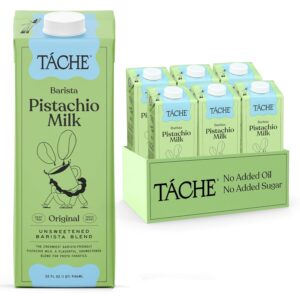
First up, we’ve got Tache Pistachio Milk. Now, I know what you’re thinking – pistachios in coffee? Trust me, it’s a great alternative for those with dairy allergies.
This creamy, slightly nutty milk choice adds a unique flavor profile to your cup of joe. It’s smooth, it’s rich, and it’s got a subtle sweetness that complements coffee beautifully.
Plus, it’s packed with nutrients, making it a healthier option than traditional dairy.
Next on our list is Pacific Almond Milk. Almond milk has been a staple in the non-dairy world for years, and for good reason.
It’s light, refreshing, and has a mild flavor that doesn’t overpower your coffee.
Pacific’s version is particularly smooth and blends well, whether you’re making a latte or just want a splash in your black coffee. It’s also fortified with vitamins and minerals, giving your morning routine an extra health boost.
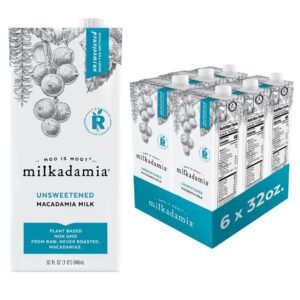
For those looking for something a bit more indulgent, milkadamia Macadamia Milk is a luxurious option. It’s incredibly creamy and has a rich, buttery flavor that makes your coffee feel like a treat.
You may decide this is the best milk alternative for lattes or cappuccinos because it froths so well. It’s also low in calories and carbs, so you can enjoy that creamy texture without the guilt.
Oat milk has taken the coffee world by storm in recent years, and Califia Farms Organic Oat Barista Blend is leading the charge. This milk choice is specifically designed for coffee drinks, meaning it froths beautifully and doesn’t separate when added to hot beverages.
It has a naturally sweet, oaty flavor that pairs wonderfully with coffee, and it’s creamy texture is reminiscent of whole milk.
For those who love the convenience of powdered creamers, Coconut Cloud Coconut Milk Powder is a fantastic option. It’s shelf-stable, making it perfect for travel or keeping in your desk drawer at work.
When mixed with hot coffee, it creates a creamy, tropical-tinged drink that’s both comforting and exotic.
It’s also great for baking and cooking, adding a coconutty twist to your favorite recipes.
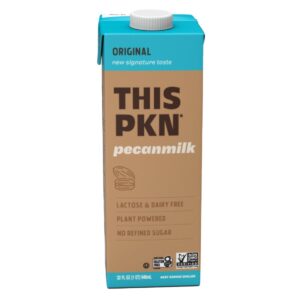
Exploring Unique Flavors
Let’s venture into some more unique territory with THIS PKN Pecan Milk . It isn’t your average milk choice – this is a rich, nutty creamer that adds depth and complexity to your coffee.
The pecan flavor is subtle but distinct, offering a Southern-inspired twist to your morning routine.It’s also packed with healthy fats and antioxidants, making it a nutritious choice.
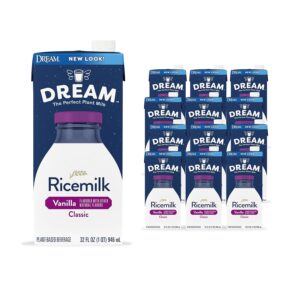
For those who prefer a lighter option, DREAM Ricemilk is worth considering. Rice milk has a naturally sweet flavor and a thin consistency that’s similar to skim milk.
It doesn’t overpower the taste of your coffee, making it ideal for those who enjoy the pure flavor of their brew. It’s also hypoallergenic, making it a safe choice for people who have many food sensitivities.
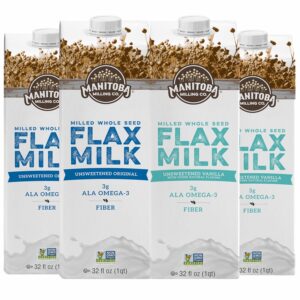
Health-conscious coffee drinkers might want to give Manitoba Milling Flax Milk a try. Flax is known for it’s high omega-3 content, and this milk choice brings those benefits to your coffee cup.
It has a slightly nutty flavor and a creamy texture that works well in coffee.
Plus, it’s a great source of plant-based protein and fiber.
Last but not least, we have Pacific Foods Unsweetened Vanilla Hemp Milk. Hemp milk has a unique, earthy flavor that some coffee lovers swear by.
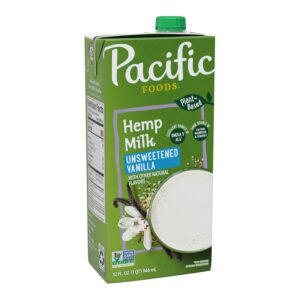
This vanilla version adds a subtle sweetness without any added sugars, making it a great option for those watching their sugar intake.
It’s also rich in omega-3 and omega-6 fatty acids, providing a nutritional boost to your morning routine.
Comparing Nutritional Profiles
When it comes to choosing the best milk choice for your coffee, there’s a lot more that matters than just taste – nutrition plays a big role too. Let’s break down the nutritional profiles of these options:
| Milk Alternative | Calories (per cup) | Protein (g) | Fat (g) | Carbs (g) |
|---|---|---|---|---|
| Tache Pistachio Milk | 50 | 2 | 4.5 | 1 |
| Pacific Almond Milk | 60 | 1 | 2.5 | 8 |
| milkadamia Macadamia Milk | 50 | 1 | 5 | 1 |
| Califia Farms Oat Milk | 130 | 3 | 7 | 15 |
| Pacific Foods Hemp Milk | 60 | 3 | 5 | 0 |
As you can see, each milk choice has it’s own unique nutritional profile. If you’re watching your calorie intake, pistachio, almond, and macadamia milk are great low-calorie options.
For those looking to boost their protein intake, hemp milk and oat milk offer more protein than the others.
If you’re following a low-carb diet, macadamia milk and hemp milk are your best bets.
Frothing and Texture Considerations
When it comes to coffee, especially if you’re a fan of lattes and cappuccinos, the ability of your milk choice to froth is crucial. Some milk choices perform better than others in this department.
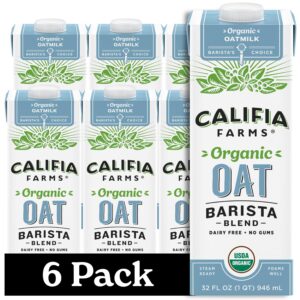
Oat milk, like the Califia Farms Organic Oat Barista Blend, is known for it’s excellent frothing capabilities. It creates a creamy, stable foam that’s perfect for latte art.
Macadamia milk also froths well, producing a silky microfoam that’s ideal for cappuccinos.
Almond milk can be hit or miss when it comes to frothing. While it does create foam, it tends to be lighter and less stable than dairy milk.
However, many brands, including Pacific, now offer “barista” versions of their almond milk that are specifically formulated to froth better.
Coconut milk, whether in liquid form or as a powder like Coconut Cloud, can create a rich, creamy froth. However, it may separate more quickly than other options, so it’s best consumed immediately after frothing.
Hemp milk and flax milk generally don’t froth as well as other choices, but they can still create a light foam that’s suitable for many coffee drinks.
Flavor Pairings and Coffee Types
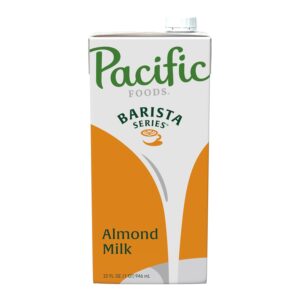
Different milk choices pair better with certain types of coffee. Here are some suggestions to help you find your perfect match:
- Light roasts: These coffees often have delicate, floral notes that pair well with lighter milk choices. Try Pacific Almond Milk or DREAM Ricemilk to complement without overpowering.
- Medium roasts: The balanced flavors of medium roasts work well with most milk choices. Experiment with Tache Pistachio Milk or milkadamia Macadamia Milk for a nutty twist.
- Dark roasts: The bold, robust flavors of dark roasts can stand up to creamier choices. Try Califia Farms Oat Milk or PKN Pecan Milk Creamer for a rich, satisfying cup.
- Espresso: For espresso-based drinks, you’ll want a milk choice that froths well. Califia Farms Oat Milk and milkadamia Macadamia Milk are excellent choices.
- Iced coffee: Light, refreshing choices like Pacific Almond Milk or Manitoba Milling Flax Milk work great in iced coffee drinks.
Remember, these are just suggestions. The beauty of having so many milk choices is that you can experiment and find your own perfect combinations.
Don’t be afraid to mix it up and try new things – you might find out about a flavor pairing you never knew you loved!
Understanding Different Plant Sources
Plant-based milks come from a variety of sources, each with it’s own unique properties:
- Nuts: Almond, cashew, macadamia, and pistachio milks offer varying degrees of creaminess and nutty flavors.
- Grains: Oat and rice milks provide a naturally sweet taste and often a creamier texture.
- Seeds: Hemp and flax milks are rich in omega-3 fatty acids and have a distinct earthy flavor.
- Legumes: Soy and pea milks are high in protein and have a neutral taste that works well in coffee.
- Coconut: Known for it’s rich, creamy texture and tropical flavor.
Nutritional Considerations
When choosing a milk choice, it’s important to consider it’s nutritional profile. Here’s a quick rundown of what to look for:
- Protein content: If you’re looking to boost your protein intake, opt for soy, pea, or hemp milk.
- Calcium and vitamin D: Many plant-based milks are fortified with these nutrients, which are important for bone health.
- Sugar content: Be aware that some milk choices contain added sugars. Look for unsweetened versions if you’re watching your sugar intake.
- Fat content: Some choices, like coconut milk, are higher in fat, which can add richness to your coffee and increase calorie content.
Flavor Profiles and Coffee Pairings
Each milk choice brings it’s own unique flavor to your coffee. Here’s a guide to help you find the perfect match:
- Almond milk: It’s light, nutty flavor works well with medium roasts and flavored coffees.
- Oat milk: The creamy texture and subtle sweetness complement dark roasts and espresso-based drinks.
- Coconut milk: It’s tropical notes pair beautifully with light roasts and cold brew coffees.
- Soy milk: The neutral flavor makes it versatile for all types of coffee.
- Macadamia milk: The rich, buttery taste enhances the flavor of medium to dark roasts.
Barista Tips for Using Milk Alternatives
Using milk choices in coffee can sometimes be tricky. Here are some tips to help you achieve the best results:
- Temperature matters: Many plant-based milks can curdle when added to hot coffee. Try warming the milk slightly before adding it to your coffee.
- Frothing techniques: Different milk choices need different frothing techniques. Experiment with temperature and frothing time to find what works best for each type.
- Barista blends: Look for “barista” versions of milk choices, which are specially formulated to work well in coffee drinks.
- Shake well: Many plant-based milks separate when sitting. Always shake the container well before use.
- Experiment with ratios: You may need to adjust the ratio of coffee to milk choice to achieve your desired taste and texture.
Environmental Impact
For many coffee lovers, the environmental impact of their choices is an important consideration. Plant-based milk choices generally have a lower carbon footprint than dairy milk, but some are more sustainable than others:
- Oat milk: Generally considered one of the most environmentally friendly options.
- Almond milk: While popular, it requires a lot of water to produce.
- Soy milk: A good option, but concerns exist about deforestation for soy production.
- Coconut milk: Generally sustainable, but transportation can increase it’s carbon footprint.
When choosing a milk choice, consider not just the product itself, and factors like packaging and transportation.
DIY Milk Alternatives
For the adventurous coffee lover, making your own milk choices can be a fun and rewarding experience. Here’s a simple recipe to get you started:
| Ingredient | Amount |
|---|---|
| Raw almonds | 1 cup |
| Water | 4 cups |
| Vanilla extract (optional) | 1/2 teaspoon |
| Honey or maple syrup (optional) | 1-2 tablespoons |
Instructions:
- Soak almonds in water overnight.
- Drain and rinse the almonds.
- Blend almonds with fresh water until smooth.
- Strain through a nut milk bag or cheesecloth.
- Add vanilla and sweetener if desired.
Making your own milk choices allows you to control the ingredients and customize the flavor to your liking.